Research Reports
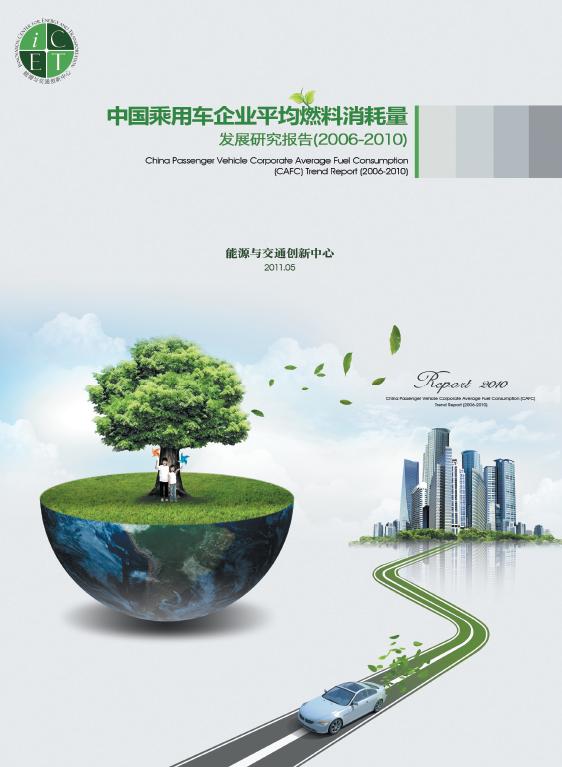
China Passenger Vehicle Corporate Average Fuel Consumption (CAFC) Trend Report (2006-2010) (May 2011 / Clean Transportation Program)
The Ministry of Industry and Information Technology (MIIT) and China Automotive Technology and Research Center (CATARC), along with major auto manufacturers have issued a draft of Passenger Vehicle Fuel Consumption Evaluation Method and Requirements, which for the first time will require the calculation of Corporate Average Fuel Consumption, and is planned to come into force in 2012. This report utilizes a CAFC methodology and data from authoritative sources such as the MIIT and China Association of Auto Manufacturers to analyze the 2006-2010 CAFC trends of 11 major automotive groups, 32 major auto companies and major independent brands and joint venture brands.
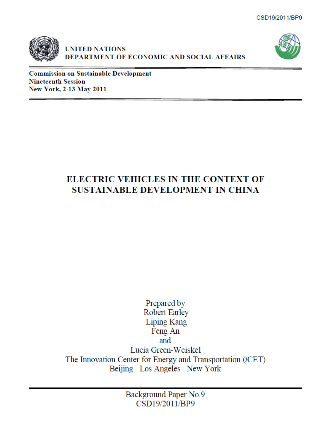
Electric Vehicles in the Context of Sustainable Development in China (for UNCSD) (March 2011 / Clean Transportation Program)
This report provides a comprehensive and systematic analytical overview of China’s automotive electric-drive technology development and electric mobility promotion policies and programes, and recent trends and projections in technology development and electricity use in private and public motor vehicles are analysed. This paper serves as background information for the 19th Session of the United Nations Commission on Sustainable Development in New York, 2-13 May 2011.
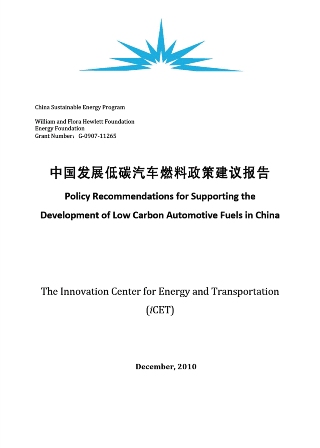
Development of Low Carbon Vehicle Fuel Policy in China Recommendation Report (December 2010 / Clean Transportation Program)
This report offers a background on China automotive fuel and international low carbon policy development experience, then sets out important recommendations for the development of low carbon vehicle fuel in China. The report also presents scenario analyses on GHG emission implications of the use of alternative fuels in China, offers a method for China to select low carbon fuels, proposes a low carbon vehicle fuel development pathway and targets, and finally makes seven policy action recommendations for the Chinese government. The report stresses the importance of using demonstration projects, government policy support, commercial application of technology and other means to achieve a 10% reduction in the carbon intensity of China’s fuel system by 2030 compared to 2005. Based on this report, iCET and the Development Research Center of the State Council of China have submitted a policy briefing, which has been presented to senior leadership and policy researchers.
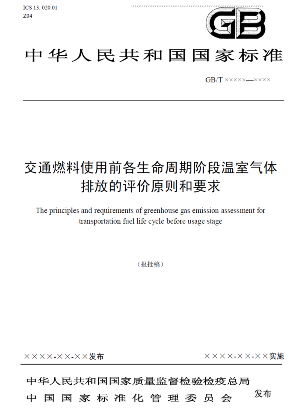
National Standard (Draft):The Principles and Requirements of Greenhouse Gas Emission Assessment for Transportation Fuel Life Cycle Before Usage Stage (Submitted for approval from the Standardization Administration of China) (December 2010 / Clean Transportation Program)
This is the first recommended standard in the “Low Carbon Fuel Standards Series” promoted by iCET, which standardizes the evaluation of GHG emission from each stage of a fuel's lifecycle before it is used. The standard is to be used by feedstock producers, fuel conversion enterprises, fuel marketers and other stakeholders, and covers biomass-based fuels, coal-based fuels, petroleum-based fuels, etc. The standard is to be used by feedstock producers, fuel conversion enterprises, fuel marketers and other stakeholders, and covers biomass-based fuels, coal-based fuels, petroleum-based fuels, etc. This standard was jointly drafted by iCET and a National Environmental Standardization Technical Committee made up of experts from the China National Institute of Standardization (CNIS), Tsinghua University, the Research Center for Eco-Environmental Sciences of the China Academy of Sciences, the Safety and Environment Technology Research Center of the China National Petroleum Company, the China Coal Science Research Institute, and COFCO Co. Ltd., and is now in the national standards approval process at the Standardization Administration of China.
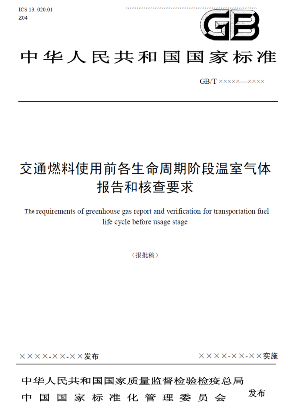
National Standard (Draft): The Requirements of Greenhouse Gas Reports and Verification for Transportation Fuel Life Cycle Before Usage Stage (Submitted for approval from the Standardization Administration of China) (December 2010 / Clean Transportation Program)
This is the second recommended standard in the “Low Carbon Fuel Standards Series” promoted by iCET, which standardizes reports and verification methods on the calculation of lifecycle GHG emissions from the production of transportation fuels before they are used. The standard is to be used by feedstock producers, fuel conversion enterprises, fuel marketers and other stakeholders, and covers biomass-based fuels, coal-based fuels, petroleum-based fuels, etc. This standard was jointly drafted by iCET and a National Environmental Standardization Technical Committee made up of experts from the China National Institute of Standardization (CNIS), Tsinghua University, the Research Center for Eco-Environmental Sciences of the China Academy of Sciences, the Safety and Environment Technology Research Center of the China National Petroleum Company, the China Coal Science Research Institute, and COFCO Co. Ltd., and is now in the national standards approval process at the Standardization Administration of China.
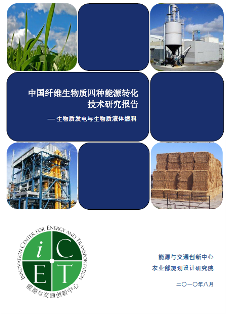
Research Report on China's Four Types of Fiber Biomass Energy Conversion Technologies (August 2010 / Clean Transportation Program)
The Report defines the status quo of China biomass resources and the utilization; outlines the technology for biomass power generation and bio-liquid fuel and the status quo of industry development. It conducts cases appraisals on biomass power generation and bio-liquid fuel technologies from the perspectives of energy, economy and environment effects; also analyzes China’s existing policies and impediments concerning fiber biomass energy. Finally, the report puts forwards several policy suggestions involving China fiber biomass energy, providing a basis for further promoting the sound and orderly development of China fiber biomass energy and the formulation of relevant policies.This report we cannot distribute because we have signed confidentiality agreements with our partners .
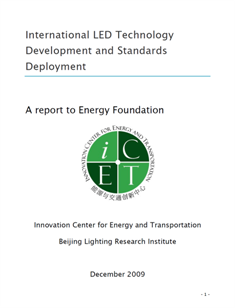
International LED Technology Development and Standards Deployment (Dec. 2009 / Cleantech Development Program)
This report is to introduce the international practice in the LED light standards and related practice in quality control and to make policy suggestions to the LED industry development and to establish and maintain a good reputation for the LED industry in China. The LED industry is a data based industry, the effective testing, standards and labeling system is key to improve the quality of LED lighting industry. The standard and labeling system need to be transparent and developed efficiently to guide the development of LED products. Education for both consumers and manufacturers is very important to ensure high quality products are recognized. The SSL products with great design and high energy efficiency parameters need to be rewarded by offering the rebate to the products and put them in the LED eligibility list for the public and private sectors to choose from. It is also very important to harmonize the testing procedures and international standards on LED products. The LED market development needs to get many essential pulls from technology development, smart system design, monetary incentives, customers recognition and acceptance and great distribution channels.
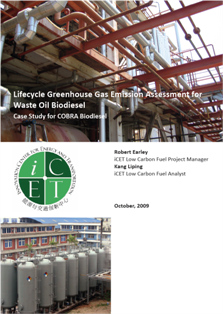
Lifecycle Greenhouse Gas Emission Assessment for Waste Oil Biodiesel - Case Sturdy for COBRA biodiesel (September 2009 / Clean Transportation Program)
The report applies an internationally developed methodology, which is adapted from the United Kingdom’s Renewable Transport Fuel Obligation Policy, to evaluate the lifecycle greenhouse gas (GHG) emissions related to a transportation fuel based on real factory production. It represents the first effort in China in this field. This report we cannot distribute because we have signed confidentiality agreements with our partners .
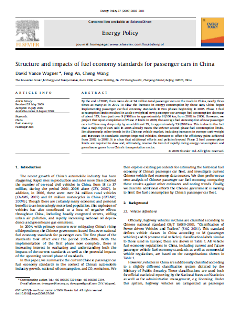
Structure and impacts of fuel economy standards for passenger cars in China.Energy Policy(July 2009 / Clean Transportation Program)
By the end of 2006, there were about 24 million total passenger cars on the roads in China, nearly three times as many as in 2001. To slow the increase in energy consumption by these cars, China began implementing passenger car fuel economy standards in two phases beginning in 2005. Phase 1 fuel consumption limits resulted in a sales-weighted new passenger car average fuel consumption decrease of about 11%, from just over 9.1 L/100km to approximately 8.0 L/100 km, from 2002 to 2006. However, we project that upon completion of Phase 2 limits in 2009, the average fuel consumption of new passenger cars in China may drop only by an additional 1%, to approximately 7.9 L/100 km. This is due to the fact that a majority of cars sold in 2006 already meets the stricter second phase fuel consumption limits. Simultaneously, other trends in the Chinese vehicle market, including increases in average curb weight and increases in standards-exempt imported vehicles, threaten to offset the efficiency gains achieved from 2002 to 2006. It is clear that additional efforts and policies beyond Phase 2 fuel consumption limits are required to slow and, ultimately, reverse the trend of rapidly rising energy consumption and greenhouse gases from China’s transportation sector.
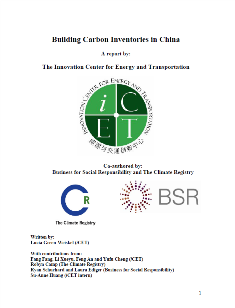
Energy and Climate Registry project Background Report - Building Carbon Inventories in China (May 2009 / Carbon Management Program)
Climate change is becoming an increasingly serious issue with an urgent need for innovative solutions. The first chapter of this report summarizes international climate policies and efforts to report emissions including the experience of the California Climate Action Registry and The Climate Registry based in the United States. The second chapter gives an overview of the considerations made when choosing Guangdong province as a site for the pilot development of an energy and climate registry. Chapter three introduces the Energy and Climate Registry project and provides detail on the project plans, timeline and partners. Chapter four gives the case for an energy and climate registry from the business perspective while chapter five explains the challenges and steps made in developing the methodology. Chapter six gives recommendations to policymakers and business leaders.